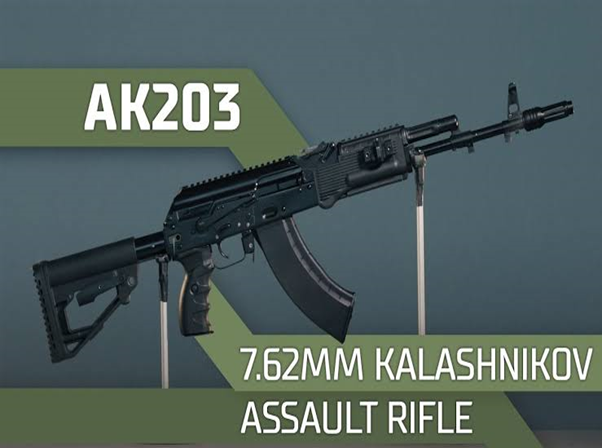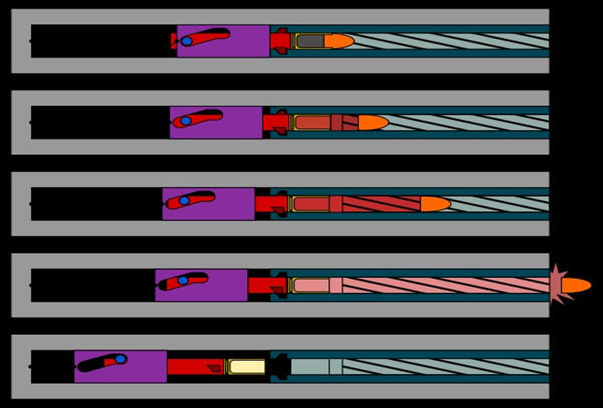Assault Rifles: AK-203
The AK-203 is a Russian origin gas operated,
magazine-fed, select fire assault rifle. It is one of the latest iterations of
the AK series of assault rifles originally designed by Mikhail Kalashnikov. It
was developed in 2010 by Kalashnikov Concern in Russia. The rifle was initially
known as AK-103M before being renamed to AK-203 in 2019.
The prototype development of predecessor of AK-203 rifle, dubbed as AK-200 series began in 2007. The first prototype of AK-200 was developed and tested in 2010. In 2013, for the Ratnik programme AK-200 was modified and renamed as AK-103-3. In 2016, AK-200 series project was revived and upgraded the AK-103-3 assault rifle prototype with KM-AK kit developed as part of the Obvs programme. The upgraded assault rifle prototype was initially designated as AK-300 and then as AK-100M and finally in 2019 as AK-203.
The Indian Army is procuring 670,000 AK-203 assault
rifles to replace the INSAS, through a contract with Russia. The first 70,000
rifles were purchased from Russia and delivered in January 2022. The remaining
600,000 rifles will be manufactured in Amethi, India under a transfer of
technology agreement, by joint venture company Indo-Russia Rifles Private
Limited (IRRPL).
Designer: Mikhail Kalashnikov
Designed: 2010
Manufacturer: Kalashnikov
Concern
Indo Russia Rifles
Indo-Russia Rifles Private Limited (IRRPL) is a rifle-manufacturing facility in Korwa, Amethi district in the Indian state of Uttar Pradesh. The factory will manufacture the AK-200 variant of the Kalashnikov family of rifles. The factory is a joint-venture of the Ordnance Factory Board of India and Kalashnikov Concern of Russia, with Rosoboron export holding a minority stake and will produce 750,000 AK-203, a 7.62×39mm variant from the AK-100 family.
Mass: 3.8 kg (8.4 lb)
Length: 880-990mm (35-37 in.) (stock extended)
Barrel length: 415mm (16.3 in.)
Barrel: It is a metal tube through which a projectile or shot charge is fired.
Cartridge: 7.62x39mm
Cartridge is a type of pre-assembled firearm ammunition
packaging of a projectile (bullet, shot or slug), a propellent substance
(usually either smokeless powder or black powder) and an ignition device primer
case that is precisely made to fit within the barrel chamber.
The 7.62×39mm (aka 7.62 Soviet, formerly .30 Russian Short) round is a rimless bottlenecked intermediate cartridge of Soviet origin. The cartridge is widely used due to the worldwide proliferation of Russian SKS and AK-47 pattern rifles, as well as RPD and RPK light machine guns.
Action: Gas-operated, rotating bolt
Gas-operation is a system of operation used to provide energy to operate locked breech, autoloading firearms. In gas-operation, a portion of high-pressure gas from the cartridge being fired is used to power a mechanism to dispose of the spent case and insert a new cartridge into the chamber. Energy from the gas is harnessed through either a port in the barrel or a trap at the muzzle. This high-pressure gas impinges on a surface such as a piston head to provide motion for unlocking of the action, extraction of the spent case, ejection, cocking of the hammer or striker, chambering of a fresh cartridge, and locking of the action.
Rotating bolt is a method of locking the breech (or rear barrel) of a firearm closed for firing. Johann Nicolaus von Dreyse developed the first rotating bolt firearm, the "Dreyse needle gun", in 1836.
Rotating bolts are found in gas-operated, recoil-operated, bolt action, lever-action and pump-action weapon designs. Another form of delayed blowback which the bolt head rotates as the firing pin strikes locking the chamber until the gas pressure reaches a safe level to extract.
Rate of fire: 700 rounds/min
Muzzle velocity: 715 m/s (2346ft/s)
Muzzle velocity is the speed of a
projectile (bullet, pellet, slug, ball/shots or shell) with respect to the
muzzle at the moment it leaves the end of a gun's barrel (i.e., the muzzle).
Firearm muzzle velocities range from approximately 120 m/s (390 ft/s) to 370
m/s (1,200 ft/s) in black powder muskets, to more than 1,200 m/s (3,900 ft/s)
in modern rifles with high-velocity cartridges such as the .220 Swift and .204
Ruger, all the way to 1,700 m/s
Effective firing range: 400-800 m (440-870 yards) (based on sight
adjustments)
Feed system: 30-round
detachable box magazine.
50-round detachable quad column magazine.
Box magazine: The most popular type of magazine in modern rifles and handguns, a box magazine stores cartridges in a column, either one above the other or in staggered zigzag fashion. This zigzag stack is often identified as a double-column or double-stack.
Quad-column magazine: Another form of box magazine, sometimes referred to as a "quad-column", can hold a large amount of ammunition. It is wider than a standard box magazine, but retains the same length.
Sights: Adjustable iron sights or picatinny rails for various optics.
Iron sights are a system of physical alignment markers (usually made of metallic material) used as a sighting device to assist the accurate aiming of ranged weapons (such as a firearm, airgun, crossbow and compound bow), or less commonly as a primitive finder sight for optical telescopes.
Picatinny rails are a type of mounting platform that are widely used in the firearms industry to attach accessories such as scopes, lasers, and bipods to firearms. The rails were first designed in the late 1980s as a standardized platform that could be used to mount accessories on a wide range of firearms.
Select fire: Selective fire, or select fire, is the capability of a weapon to be adjusted to fire in semi-automatic, fully automatic, and/or burst mode. The modes are chosen by means of a selector switch, which varies depending on the weapon's design.
AK-100 Series:
The original AK-100 series rifles were introduced in 1994 and
are categorized by all having black polymer handguards, folding polymer stocks,
and use of AK-74M internal systems. Parts are highly interchangeable.
AK-200 Series:
The AK-100M/AK-200 rifle
family was initially conceived around 2009 as an improved variant of the basic
AK-100 series. Most improvements centered on ergonomic improvements and
mounting systems for accessories. The development of the AK-100M/AK-200 family
was stopped around 2011 but resumed around 2016. In 2017, Kalashnikov unveiled
the modernized versions of the AK-100 family of rifles. The AK-200 series are
somewhat heavier and less advanced compared to the AK-12 family, but also
cheaper.
As of 2018,
the AK-200 series rifles are offered for exort sales and for domestic law
enforcement users in Russia. The AK-200 series are based on the AK-100 series
and the AK-12.
YouTube links (for better visualization):
AK-203 3d Animation: https://youtu.be/VMOjQFr2JD0
Quad-column magazine: https://youtu.be/y7iqC8c5f4k
7.62 x 39mm: https://youtube.com/shorts/a5O3Qjp5D9g?feature=share
Gas operation: https://youtube.com/shorts/ml9tpzQ5BWs?feature=share
Rotating bolt: https://youtu.be/umeoGsxYPww
Gas operation, rotating bolt: https://youtube.com/shorts/PrC3Z1QrypM?feature=share
Picatinny rails: https://youtube.com/shorts/S53gWYQ07Ts?feature=share
Select fire mechanism: https://youtu.be/PaFHuqBmDmk
AK-200 series: https://youtu.be/-MO6MI6lM9g
AK-203 Indo-Russia joint venture: https://youtube.com/shorts/re-48r0JHi4?feature=share


















%20(13).jpeg)
%20(7).jpeg)
Comments
Post a Comment